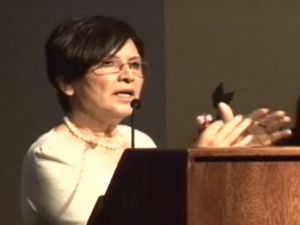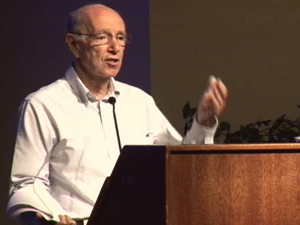Researchers Discuss Role of Culture in Human Development at ISCAR Congress
San Diego, CA, Sept. 18, 2008 — More than 700 academics from 40 countries converged at UC San Diego and the California Institute for Telecommunications and Information Technology (Calit2) last week for the ISCAR Congress, a worldwide conference on the role of culture in human development.
|
ISCAR — the International Society for Cultural and Activity Research — is comprised of researchers in the fields of psychology, anthropology, linguistics, education studies and other humanities and social sciences who study the social, cultural and historical dimensions of human activity as they are influenced by context, or environment. The conference featured more than 240 workshops, panel discussions and "fireside chats" pertaining to the congress' theme, "Ecologies of Diversities," a reference to the many types of social, intellectual and physical environments that the researchers examine in their work. Video files for 75 of the lectures will be available soon on the Calit2 Multimedia site.
Conference President Olga A. Vásquez, a UCSD professor of communication, says the researchers in cultural and activity theory seek to comprehend human development by examining the world we live in, be it on a macrocosmic or microcosmic scale. By understanding the environments in which we learn and grow, says Vasquez, the researchers can change them for the better.
"I see this work as interventionist work," she explains, noting that the presentations included topics in on community mobilization approaches to HIV/AIDS, as well as technology education for socially marginalized students in rural communities. "One way of looking at it is as the study of 'culture in mind and mind in culture,' or the effects that environment has on learning and development. That can mean everything from the architectural design of a classroom to the way that Brazilian street children selling candy and gum learn about mathematics.
"In other words, this type of work examines how humans function in a particular environment, but it doesn't stop there. As researchers, we try to tweak environments so humans can be more successful."
One example of such research is UC San Diego professor Michael Cole's work with Fifth Dimension, an after-school program that forges relationships between community centers and local colleges to create learning environments that emphasize computer technology and diversity. Cole, a professor of psychology and communication, has long been an advocate of the program, which at UCSD pairs undergraduates with students at the Town & Country Learning Center in South San Diego (Calit2 and the San Diego Supercomputer Center are also partners in the project). He spoke about the program and its current successes and challenges at an ISCAR session titled, "Cultural-Historical Activity Theory and Interventionist Methodology: Classical Legacy and Contemporary Developments," as well as during a panel discussion titled "Creating Socio-Cultural Idiocultures to Remediate the Effects of Cerebral Palsy and Traumatic Brain Injury."
In addition to presenting several other talks at the conference, Cole also gave one of the keynote addresses during the congress' opening ceremonies. His lecture, "Culture and Development in the Age of Hyper-Globalization," was followed by a keynote welcome address by UCSD Chancellor Marye Anne Fox.
|
UCSD and Calit2 co-sponsored the event, which was held Sept. 8-13 at various locations in the UCSD Price Center, Warren College and Calit2's Atkinson Hall. At least two of the sessions were made possible through Calit2's teleconferencing technology, which allowed several ISCAR members in Moscow to participate in the conference from afar. Many sessions were broadcast via live Internet video feed, and ISCAR members who couldn't attend in person made their presence known by way of online 'avatars' and Skype interfacing. In addition, one session (which featured Michael Cole and other researchers in their 'avatar' form), was intended to be conducted in the Internet-based 3-D virtual world, "Second Life."
Explains Vásquez: "The idea with the Second Life project was to examine 'mind' in another dimension. We wanted to experiment with the possibilities of engaging with the ideas of the conference within a whole different virtual world."
Although the conference organizers ran into technical difficulties with the Second Life presentation, Vásquez notes that the technologies provided by Calit2 and UCSD "made it possible to extend our reach beyond our physical parameters," expanding the conference's sphere of influence well beyond that established at the first ISCAR congress, held in Seville, Spain, in 2005.
"Unprecedented is the way I would characterize it," she adds. "We extended way past the tradition, and offered talks on many ecologies that weren't addressed at the first congress. Intellectually, I think we pushed all sorts of boundaries."
Perhaps the most important benefit of the conference was that it brought researchers in the field together and inspired them to carry on with their work in new ways, Vásquez says.
"While I was listening to these talks, I had this yearning to get back to my research," she laughs. "I missed it so terribly! It's so enlightening to think you can make a difference through hard but very scholarly work and frame it from this perspective."
Related Links
Media Contacts
Tiffany Fox, (858) 246-0353, tfox@ucsd.edu


